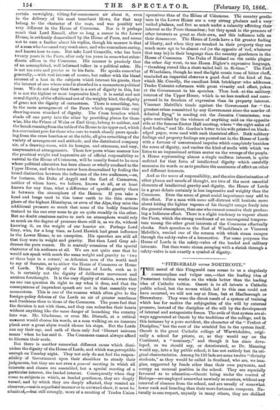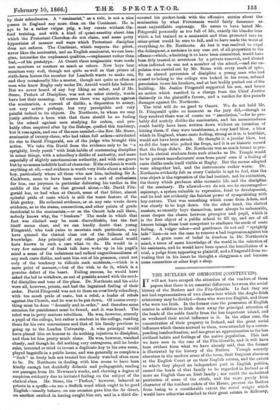" FITZGERALD versus. NORTHCOTE."
THE moral of this Fitzgerald case seems to us a singularly _L. commonplace and vulgar one,—that the leading idea of Protestant tuition works on the whole better than the leading idea of Catholic tuition. Oscott is to all intents a Catholic public school, but the scenes which led to this case could not have occurred, we will not say at Eton, but at Marlborough or Shrewsbury. They were the direct result of a system of training which has for motive the subjugation of the will by external pressure, instead of the discipline of the will by the development of internal and antagonistic forces. The evils of that system are al- ways aggravated at Oscott by the traditions of the college, and in this instance by a pure accident, the character of the " Prefect of Discipline," but the root of the mischief lies in the system itself. Oscott is the great Catholic college of Warwickshire, origi- nally a school for priests; or, as they would say on- the Continent, a " seminary," and though it has since deve- loped, as we should say, or deteriorated, as Dr. Manning would say, into a lay public school, it has not entirely lost its ori- ginal characteristics. Among its 150 lads are some twelve "divinity students," as they would be called in Scotland, who are, we ima- gine, supported by funds other than their own payments, and occupy an unusual position in the school. They are especially favoured as to education—Oscott being under the control of Bishops—are employed somewhat unwisely as masters, without any interval of absence from the school, and are usually of somewhat lower rank and breeding than their more fortunate compeers. Na- turally. in one respect, unjustly in many others, they are disliked by their- schoolmates. A " seminarist," as- a rule, is not a nice person in England any more. thansen the Continent. He is apt to be a rather vulgar. prig, as boy curate. without -0x- . ford training, and with- a kind....of-, quasissanetity about-him which the Protestant- Churches.. do not claim, and some petty hypocrisies of manner and ways which Protestant discipline ,does not enforce. The Continent, which respects the , priest, never likes the seminarist, and an English. seminarist, wecan imas gine, intensifies the_ unpleasant qualities,—unpleasant rather than.- bads—of his prototype.. At. Oscott these senljnn.rists were made. not, monitors or masters so much. as ushers. Now boys bear monitors very well, though not. quite. so 'well as that . prince. of sixth-form heroes: hs member for Lambeth wants to make out, and they occasionally, like a master, though not quite so often as. men who knew Rugby only under Dr. Arnold would fain believe.. But we never heard of any boy liking an usher, and if Mr.. Stone, Prefect. of Discipline, was not an usher strictly, words have lost their meaning. Of course there was agitation the seminarists, a current of dislike, a disposition to annoy; not very active perhaps, but very perceptible and very painful indeed to its objects. Dr. Northcote, to whom we may, justly attribute a keen wish that there. should be no feeling, in the school against men studying for orders, and pro- bably often enquired after by the Bishops, quelled this tendency, but it rose again, and one of the men assailed—the Rev. Mr.. Stone, seminarist of twenty-three, who had taken full orders—attributed its rise to David, Fitzgerald, son of the judge who brought this action. We take this David from the evidence only to be " a sprightly, lively youth" with Irish habits of contemning discipline in minor things, with a schoolboy's dislike of authority, and more .especially of slightly sanctimonious: authority, and with one grave but by no-means indelible fault of character. lithe evidence is worth anything at all,—and evidence is worth very ad...about a school- boy, particularly where all those who saw him, including. Sir A. Cockburn, seem to have been moved to .a sort of.. enthusiasm for him, one juryman in particular delivering his verdict in the middle of the trial on that ground alone,—Mr. David Fitz- gerald has, or had when at Oscott, some of that bitter, almost .spiteful pride of caste which is still the worst, feature of the. Irish gentry. He collected evidence,. or. at- any rate wrote down evidence, as to the statussconnectionsrand other points of grade incidental to the seminarists,—or as. the . Oscott lads. call them, -nobody knows why, the " bunkerss"' The. mode in which that, fact was elicited may be most, discreditable, but the fact itself seems clear, and we can.. hardly., doubt that. young Fitzgerald, who .took pains to ascertain such particulars,. may have quizzed the clerical .class out of the. fullness._ of his knowledge. Any principal-of any other pisblic school. would -have known in such a case- what to do.. He would in a. =very few minutes' of frank talk - have woke up in his pepil's mind a sense of the unfairness and radical ungentlemanlineas of. :any such caste dislike, and sent him out of his presence, cured not .only of the tendency to ridicule. such accidentes—which is a mere point of manner,—but of the wish to do it, which is a genuine defect of the heart. Failing_ success, he would have asked the lad to withdraw, as out of possible-accord with theneed- lul discipline and tone of. the place. Dr. Northcote and his aides were all, however, priests, and had the. ingrained . feeling of their, order. David Fitzgerald was not to them an over livelyschoolboy, with too much pride of caste, but a rebel, a leader of rebels .against.the Church, and he was to be put down,... Of course everys thing must be done "decently and inarder," and therefore some occasion for punishment must be found., and it. waa.found. The rebel was in petty matters rebellious: He. was; however, scarcely a pupil of the college, but rather a student in the college, residing there for his own convenience and that of hia family previous to going up to the London University. A. wise principal would have placed him on honour to .do .nothing injurious to discipline, and then let him pretty much alone.. He was, however, watched closely, and though he did nothing very outrageous, still he broke rules, invented or tried to invent a duplicate.key to his own room, played bagatelle in a public house, and was generally, as•complete a " limb " as lively lads not trusted but closely watched often seem to be. Dr. Northcote in dealing with. him seems to have been kindly enough but decidedly didactic and pedagoguish, reading out passages from Dr. Newman's works, and, showing a degree of suspicion evidently due fo irritated feeling, on the subject of the clerical sleets Mr. Stone, the " Prefect," however, behaved as priests in a spuftle--to use a Suffolk word which ought to be good English—usually behave, on one occasion gave him the lie direct, on another exulted in having paughthim out, and in a third dis- ,covered his .pocket-boels with,. the offensive entries about the seminarists by what . Protestants would fairly , denounce. as.. most, unjustifiable espionage. He seems to have. hated. Mr. Fitzgerald personally as too full of life, exactly the blunder into which a lad trained as_ a seminarist and then promoted into an.. usher-priest would, be sure to • fall, and to have made the worst of everything-; to. Dr. Northcote. At last it was resolved to expel , ,the:delinquentsa sentencein any case out. of all proportion to the reffence.—whichs admitting.it.to have been committed, would lave been.fitly treated at seventeen by a private removal, and absurd when inflicted on one not a member of the school,—and the ex-, puleirm .wasearried out by Mr. Stone with every, mark of spite. By an absurd perversion of discipline- a . young, man who had ceased to belong to the college was locked in his room, refused permission to see his .brothers, and at last bodily pushed out of the building, Mr. Justice Fitzgerald supported his son, . and hence an-action which resulted in a charge_ from the . Chief Justice distinctly in_the plaintiff's favour, and a verdict for five pounds damages against. Dr. Northcote.
The trial will .do no good to Oscotts We do. not hold Mr.. D.. Fitzgerald quite so innocent as the jury did,—though as they resolvedtthere was, of course no " association,"—for he pro- bably did. acutely. dislike, the seminarists, and his memorandums. could,. hardly lave, been written. down without . an intention of hitting. them,: if they were troublesome, a very hard blow, a blow which in England, where caste feelings strong as .itis, is healthier, would. not have been struck. He thought it. a jocular blow, but. so did the boys who pelted the frogs, and it is on historic :record that the frogs didn't. Dr. Northcote was as much bound to pro- tect his. clerical students from such attacks as Dr, Temple-would be to protect manufacturers' sons from peers! sons if a feeling of caste dlelllresnadesitself visible at Rugby.: But the means adopted were altogether bad, and the instruments :rather worse. Dr. Northcotsevidentlyfelt as every Catholic is apt to feel, that the true. objeetis the. repression of the bad instinct, not its extinction, the theory , which produces alike monastic life. and the discipline of the seminary. He allowed—we do mot, see. he encouraged-- espionage, a system: aluable to repression,.. fatal to development, and ,he.had not evidently the faintest power of sympathizing with boy-nature.. That was something _which. came from Adam, and was „dearly to be kept down. On the other hand, .the clerical masters, so recently boys themselves, must always be unbearable, must deepen the chasm between preceptor and. pupil, which it is the first object of a public school. to fill up, and .are of all human beings-thoee least competent to eradicate the seeds of caste feeling. A. vulgar _usher—and gentlemen do not call " sprightly lads" liars—is, not the man to remove a bad impressionagainst his. caste. A. grain more of belief in freedom in Dr. Northcote's. mind, a trace of . more knowledge of the world in the selection of his aseistantssand. he would, have been spared the humiliation of a trial, a judge from appearing as plaintiff, and a Fitzgerald from re- Nealing that in hissheart he. thoughts, clergyman a cad because some connection or ether kept a shop.































 Previous page
Previous page